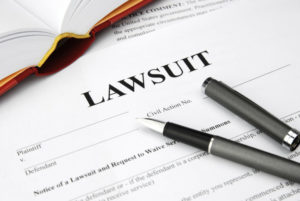Home \ Employment Law Resources \ How to File A Wrongful Termination Lawsuit

If you have been fired from your job, you may wonder if you can file a wrongful termination lawsuit. A wrongful termination suit may be justified in some situations. However, proving that you were wrongfully fired can be a complicated process.
You should seek legal advice from an experienced wrongful termination lawyer in California before you take any steps to file a wrongful termination claim.
Can I Sue My Employer for Firing Me in California?

If your employer fired you, you need to determine if the termination was legal or illegal. You can only sue your employer if the termination was illegal.
California is an “at will” employment state for most employment positions. In an “at will” employment state, an employer can terminate employment at any time and for any reason.
The employer can terminate employment for no reason at all. Likewise, the employee can resign at any time.
However, there are some exceptions. The employer’s reason for terminating the employee must not be illegal. If the employer violates the employee’s rights under employment or discrimination laws, the employee may have a valid wrongful termination claim.
Reasons Why an Employee May Sue an Employer for Wrongful Termination
State and federal laws protect employees in the workplace. Violating any of these laws might be grounds for suing for wrongful termination.
Grounds for a lawsuit against an employer may arise from situations involving:
Employment Discrimination
California employment discrimination laws make it illegal to fire an employee based on discrimination. If an employer fires an employee for a protected characteristic, the employee can file a wrongful termination lawsuit based on discrimination.
The Equal Employment Opportunity Commission (EEOC) lists federally protected characteristics as:
- Color
- Race
- Sex (including sexual orientation, pregnancy, and gender identity)
- Religion
- Age (40 years and older)
- National origin
- Genetic information
- Disability
However, California anti-discrimination laws have additional protected classes. Marital status, medical condition, and military or veteran status are also on California’s list of protected classes. If an employer fires an employee for a reason related to a protected class, the employee can file a lawsuit for wrongful termination based on discrimination.
Employment Contracts
Employment contracts can have an impact on wrongful termination claims. If you have an employment contract, you may not be an at-will employee. Suppose the contract defines your employment duration and does not specify that you are an at-will employee. In that case, you could sue your employer if you are terminated before the completion of the employment contract.
However, the employer can terminate you for cause if you violate the employment contract’s terms and conditions. The factors that led to your termination and the employment contract terms must be analyzed carefully to determine whether you can file a claim for wrongful termination.
Employee handbooks are not the same thing as an employment contract. A contract defines your specific terms of employment and only applies to you. An employee handbook applies to all employees and generally states that employees are at-will employees unless they are under contract.
Violating Public Policy
Terminating an employee for reasons that violate public policy is against the law. For example, employers cannot fire you because you took time off to vote or serve in the National Guard. Employers are not allowed to fire an employee who has to miss work because of jury duty.
Additionally, an employer cannot fire an employee because they reported sexual harassment or filed a workers’ compensation claim. Firing an employee for reporting wrongful or illegal activity in the workplace (whistleblowing) is also against public policy.
Constructive Discharge
When an employee is forced to quit because of a hostile work environment, the employee may have a constructive discharge claim.
Constructive discharge occurs when an employee resigns due to continuous or severe mistreatment in the workplace, such as:
- Harassment
- Discrimination
- Intolerable working conditions
- Mistreatment
- Adverse changes in pay or job duties for non-work related reasons
- Refusal to make reasonable accommodations for a disability
- Retaliation for whistleblower activities, exercising rights under the FEHA, or filing a workers’ comp claim
California law defines constructive discharge as an employer knowingly permitting or intentionally creating intolerable or aggravated working conditions that would cause a reasonable employee to have no choice but to quit. Unpleasant work conditions or quitting because you do not like your job or co-workers are not sufficient grounds for filing a complaint for wrongful termination at will.
Can You Sue for Wrongful Termination?
The first step is to consult an employment attorney to review the facts of your case. There are different deadlines and steps for filing a wrongful termination claim.
For example, there may be slight differences in how to file a discrimination lawsuit versus a constructive discharge lawsuit. An experienced employment lawyer understands how to file the correct lawsuit for wrongful termination.
If you believe you need to file a wrongful termination lawsuit, begin gathering and preserving evidence immediately. Your attorney may obtain evidence through the discovery process of the lawsuit. However, your employer could destroy or conceal evidence, so it is best to begin gathering your evidence now.
Evidence that you want to preserve includes:
- Copies of employment contracts and employee handbooks
- All written documents your employer gave you regarding your termination
- Copies of past performance reviews
- Copies of emails or other evidence creating a hostile work environment
Verbal communications are also important evidence in a wrongful termination lawsuit. Write down conversations you have had regarding your job, job performance, expectations, job security, and termination. Note the date of each conversation and the parties involved in the conversation.
Do not wait too long to consult an employment lawyer about your claim. If you miss any of the deadlines for filing claims or lawsuits, you might not be able to hold your employer liable for the damages caused by an unlawful termination.
What Damages Can I Receive for a Wrongful Termination Lawsuit?
The damages awarded for unlawful termination depend on the facts of the case.
However, you could be entitled to compensation for your:
- Loss of income and benefits you would have earned had you not been wrongfully terminated
- Attorneys’ fees and the cost of filing the wrongful termination case
- Emotional distress and mental trauma caused by the wrongful termination
- Punitive damages in cases in which an employer engaged in malice, fraud, or oppression
The above damages are not available in all types of wrongful termination cases. However, loss of income and benefits are generally available in all types of unlawful termination cases.
Contact Our California Wrongful Termination Lawyer for a Free Consultation
If you believe you were wrongfully terminated, contact our office for a free consultation with a California wrongful termination attorney. Your initial consultation is confidential and free of charge. You are under no obligation to hire our law firm after meeting with our attorneys for legal advice. Call us today at (619) 693-7727.
